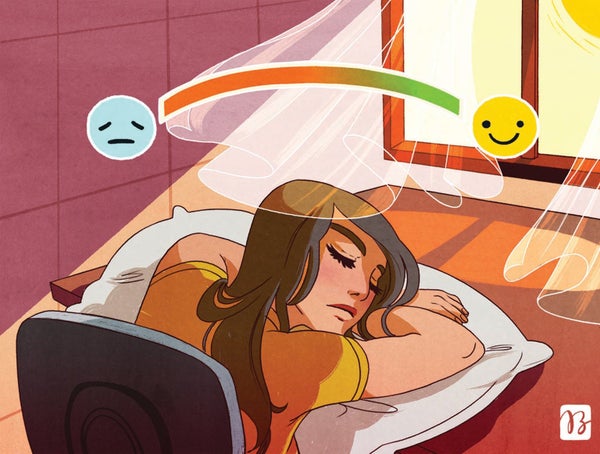
[ad_1]
December 1, 2023
3 min read
A light midday snooze boosts memory and other types of cognition—and your mood

I have a confession: I nap. Most days, after lunch, you will find me snoozing. I used to keep quiet about it. Other countries have strong napping traditions, but here in the U.S. it is often equated with laziness. In 2019 a U.S. federal agency even announced a ban on sleeping in government buildings.
I’m going public about my nap habit now because, despite what bureaucrats may think, sleep scientists are increasingly clear about the power of the nap. That shift is part of the relatively recent recognition that the quality and duration of sleep are public health issues, says physiologist Marta Garaulet of the University of Murcia in Spain.
For a time, research was both for and against napping. Many studies showed mood and cognition benefits from midday rest, yet others found links to poor health, especially in older adults. That left some experts hesitant to “prescribe” naps. More recent research, though, has clarified that different types of naps have different effects. A number of scientists now think the sweet spot is about 20 to 30 minutes.
The urge to nap is governed by two physiological processes. One is called homeostatic sleep pressure (HSP), and it builds the longer you are awake. The other involves daily circadian rhythms, which leave everyone a little sleepy in the afternoon. Some people, like me, are habitual nappers even when we get adequate sleep at night. Others can’t nap unless they are severely sleep-deprived. Genes, such as those that underlie HSP, drive much of the difference.
Short naps do indeed have cognitive benefits, says Michael Chee of the Center for Sleep and Cognition at the National University of Singapore. In a 2022 analysis, his team found especially significant improvements in certain kinds of memory, information-processing speed and vigilance (the ability to respond to an unexpected event, say, a swerving car). A nap also simply makes many people feel better. “No one talks about mood enough,” but, Chee says, tired people tend to be grumpy people.
It doesn’t take much sleep to see these boosts. “Even a short, 10-minute nap will refresh you,” Chee says. “If you do a little longer, the cognitive benefits last a little bit longer as well,” and that’s why half an hour, give or take a bit, has emerged as a good nap span. “You’ll get mostly light sleep” in that time, says Ruth Leong, who works with Chee in Singapore, and that makes it easier to wake up. Leong advises people who work typical day hours to avoid napping much after 5 P.M. so they don’t throw off their nighttime sleep.
Cognitive benefits do show up after naps that extend past 30 minutes, and those benefits last longer. But longer naps let a person move into deeper sleep and increase “sleep inertia,” that groggy feeling on waking. Even though the grogginess can pass relatively quickly and not everyone gets it, many people find it unpleasant.
Longer naps are also associated with some health problems. In a 2023 study of more than 3,000 otherwise healthy Europeans with an average age of 41, Garaulet and her colleagues found that those who napped for more than 30 minutes at a time were 23 percent more likely to be obese than those who didn’t nap at all. (Obesity was calculated with the body mass index and several other indicators.) They were also more likely to have a combination of high blood pressure, high cholesterol, and other health issues. In addition, long naps reduce the body’s ability to lose fat on a diet, Garaulet has shown.
But it is probably a disease that causes the extra napping and not the other way around. That’s what happens with Alzheimer’s, for instance. Even in younger adults, researchers have found a link between increased brain inflammation and more napping. If someone begins to need frequent naps (more than once a day) and to regularly sleep for more than an hour, that could be a sign of illness, Chee says.
Because my naps tend to be 20 minutes long and leave me feeling alert and productive, I no longer feel sheepish about them. Instead I feel lucky that napping comes easily to me … and that I’m finishing this column right before lunch.
[ad_2]